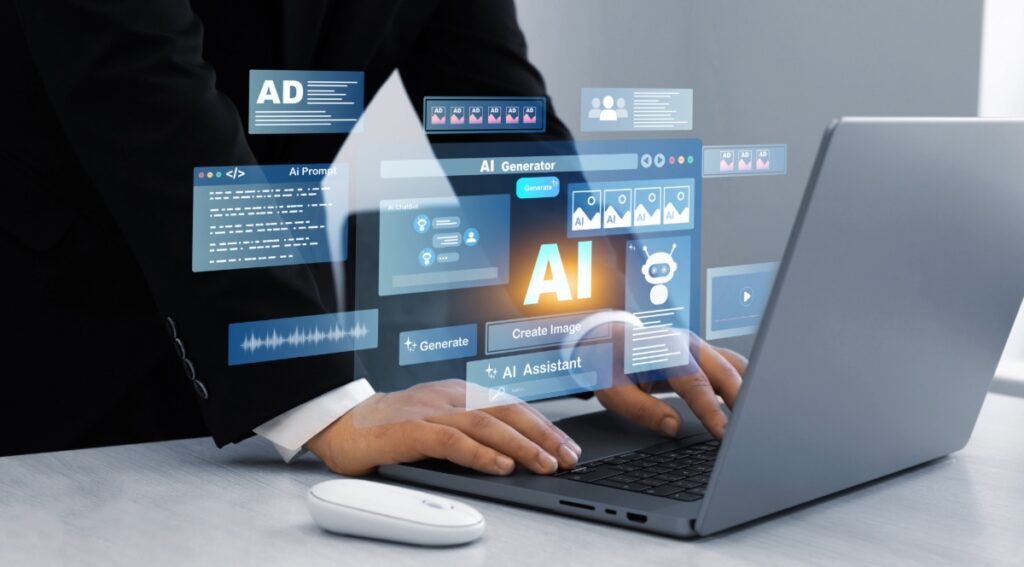The workplace landscape just shifted dramatically with growing demand from employers for AI skills. Moreover, if you’re not paying attention, you might find yourself on the wrong side of history.
New York recently became the first state to require companies to disclose when artificial intelligence contributes to layoffs¹. Furthermore, this groundbreaking legislation reveals a harsh reality: AI skills save job security in 2025 more than any other factor.
However, here’s what most headlines won’t tell you—companies aren’t simply replacing humans with AI. Instead, they’re replacing employees who can’t leverage AI with those who can.
The Reality Behind AI-Related Job Displacement
According to recent analysis of over 500 job postings across major industries, the demand for AI proficiency has skyrocketed:
- 89% of marketing positions now require ChatGPT or similar AI tool experience²
- 76% of project management roles list AI automation tools as essential skills
- 82% of content creation jobs demand hands-on AI expertise
Additionally, research from the Bureau of Labor Statistics indicates that workers with AI skills earn 15-25% more than their counterparts³. Therefore, the question isn’t whether AI will impact your career—it’s whether you’ll be prepared.
7 Critical AI Skills That Employers Now Demand
1. Advanced Prompt Engineering
First and foremost, knowing how to communicate effectively with AI tools separates professionals from amateurs. Consequently, mastering prompt engineering means crafting specific, context-rich instructions that generate professional-quality outputs.
Industry Application: Marketing professionals use advanced prompts to create comprehensive campaign strategies, while project managers develop detailed project timelines in minutes rather than hours.
2. AI-Powered Content Creation
Subsequently, the ability to leverage tools like ChatGPT, Jasper, and Claude for content creation has become non-negotiable across industries. Furthermore, this skill extends beyond simple text generation to include strategic content planning and optimization.
Key Tools to Master:
- ChatGPT for strategic content planning
- Midjourney for visual content creation
- Notion AI for collaborative content development
3. Automated Workflow Design
Meanwhile, professionals who can design and implement AI-powered workflows are becoming invaluable. Additionally, this skill involves understanding how to integrate multiple AI tools into existing business processes.
4. Data Analysis with AI Assistance
Similarly, AI-enhanced data analysis capabilities allow professionals to extract insights from complex datasets quickly. As a result, employees who combine domain expertise with AI analytical tools deliver superior results.
5. AI Tool Integration and Management
Moreover, understanding how to select, implement, and manage AI tools within organizational systems demonstrates strategic thinking. Consequently, this skill often leads to leadership opportunities and increased responsibility.
6. Quality Control and AI Output Optimization
Furthermore, the ability to evaluate, edit, and optimize AI-generated content ensures professional standards. Therefore, this skill bridges the gap between raw AI output and polished professional deliverables.
7. Strategic AI Implementation Planning
Finally, professionals who can assess when and how to implement AI solutions strategically position themselves as change leaders. Subsequently, this skill involves understanding both the capabilities and limitations of current AI technology.
Industry-Specific AI Requirements in 2025
Marketing and Advertising Professionals
Digital marketing specialists must now demonstrate proficiency with:
- HubSpot AI for campaign optimization
- ChatGPT for content calendar creation
- AI-powered analytics tools for performance tracking
Project and Operations Management
Project coordinators and operations managers need expertise in:
- ClickUp AI for task automation
- Notion AI for team collaboration
- AI-powered resource allocation tools
Content and Media Production
Content creators and media professionals require skills in:
- Synthesia for video content creation
- Runway for video editing automation
- AI voice generation tools like ElevenLabs
How to Future-Proof Your Career Today
First, assess your current AI proficiency honestly. Then, identify which tools are most relevant to your industry. Next, commit to hands-on learning rather than passive consumption of AI content.
Immediate Action Steps:
- Start with industry-specific AI tools rather than generic applications
- Practice daily with small, low-stakes projects
- Document your AI-enhanced work processes for portfolio development
- Network with other AI-savvy professionals in your field
- Stay updated on industry-specific AI developments
The Cost of Waiting
Unfortunately, the window for learning AI skills at a comfortable pace is closing rapidly. Moreover, early adopters are already establishing themselves as AI experts within their organizations. Consequently, delaying this learning puts you at a significant competitive disadvantage.
Research indicates that employees who develop AI skills now will likely see:
- Faster promotion opportunities
- Higher salary potential
- Greater job security during economic uncertainty
- Increased ability to pivot between roles and industries
Your Next Steps Forward
The evidence is clear: AI skills save job security in 2025 across virtually every industry. Therefore, the choice is simple—adapt now or risk being left behind.
Start by identifying which AI tools are becoming standard in your industry. Then, commit to learning one new AI skill each month. Finally, begin incorporating AI into your current work processes to demonstrate value immediately.
Which AI skill will you master first to secure your professional future? Bookmark this post for your career development planning!
References:
- New York State Department of Labor, “AI Disclosure Requirements,” 2024
- Industry Analysis, “AI Skills in Job Postings Report,” 2024
- Bureau of Labor Statistics, “Emerging Technology Skills Premium,” 2024
